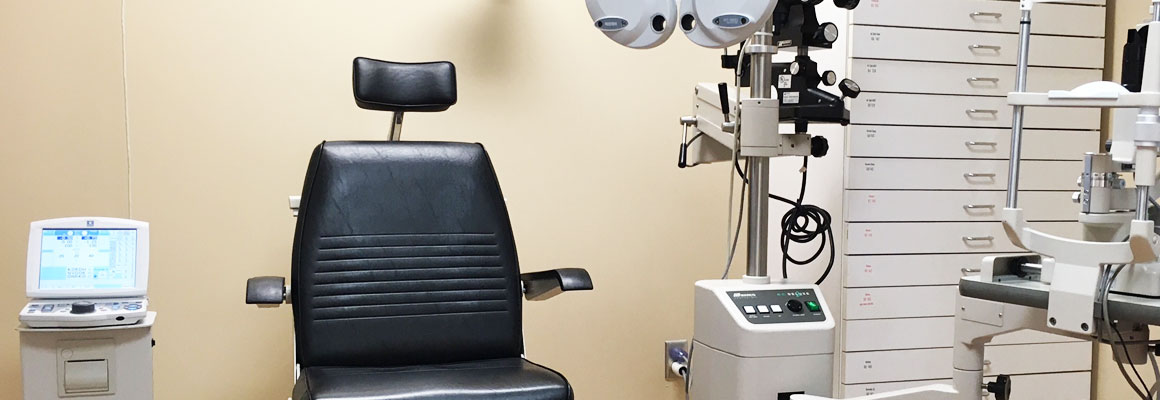

We want to thank all our new and current patients for visiting our office and website. Carolina Optometry Associates is a private practice, owned and operated by Dr. Andrew Graves and Dr. Melissa Graves. We are located at the Apex and Raleigh (Wake Forest Rd) Costco locations. We are also fortunate to employ Dr. Gayatri Dhruva at our Raleigh location on select days. We function as a comprehensive eye exam location with the ability to treat and manage many eye diseases. Please read below for more information regarding our practice and what we have to offer.
Due to high demand for services, we are seeing patients by appointment only. When scheduling, please have insurance information available if necessary. We are also able to schedule via text and email at this time. Due to the high volume of phone traffic throughout the day, text and email options can help expedite the process.



Cataracts in most cases are a natural age related change to the lens inside the eye. About age 40 and up, we start seeing early signs of cataract changes occurring. Along with age, it is believed that smoking and diabetes can also increase our changes of developing cataracts. Being that this condition is mostly related to age, there is an increasing number of Americans that have cataracts currently or have had cataract surgery in the past.
Some of the most common symptoms associated with cataracts include blurred/hazy vision, double vision/diplopia, poor night vision, glare and halos around lights, and trouble seeing in dim lighting such as restaurants.
The most common types of cataracts are nuclear, cortical, and posterior subcapsular. Each of these occur most commonly due to the risk factors such as age, UV exposure, trauma, and high risk medications.
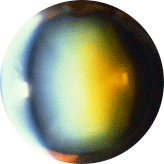
Nuclear cataracts are formed as a general facet of aging and can become more troublesome due to UV radiation exposure from the sun. With this type of cataract, the natural lens changes from clear to yellow to brown. As the density or color becomes more prominent in the lens, the patient starts to see more abrupt vision changes.
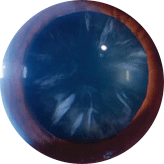
Cortical cataracts are very common and lead to a primary visual symptom of poor night vision. This type of cataract creates opaque spokes similar to that of a bicycle wheel that extend near or into the pupil and create a lot of glare, especially at night.
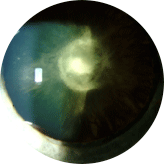
Posterior subcapsular cataracts are known to cause the most pronounced visual impact. These cataracts are typically fast growing and occur for numerous reasons. The most common reasons these cataracts can develop would be systemic illness such as diabetes or autoimmune conditions that require high or long term dosage of oral or injectable steroids.
At Carolina Optometry Associates, we evaluate the lens changes along with the visual system during your comprehensive eye health examination. This should be performed at least yearly to follow not only cataracts but other vision threatening diseases. Our highly trained doctors will determine if and when cataract surgery is the best option moving forward. We also will provide post-operative care and have numerous surgical referral groups that we co-manage with to give you the most convenient and comfortable care.
If cataracts are a concern for you, please feel free to contact our office and we will schedule an appointment as soon as is convenient.
Diabetic Retinopathy is one of the leading causes of blindness in our middle aged population. A vast majority of patients who have been diabetic for over 10 years have some form of diabetic retinopathy. There are also many cases where the clues our doctors find in the routine eye exam that help in the first time diagnosis of diabetes. The vascular system can become fragile over the course of time with blood sugar changes and can lead to leakage within the retina. With earlier diagnosis and proper management, the cases of blindness resulting from this disease can be reduced drastically.
The changes that occur with the retinal blood flow occur in four stages:
Mild Non-proliferative Retinopathy occurs in the very early stages of vascular insult. This usually affects the small blood vessels within the retina and can lead to swelling and small hemorrhages.
Moderate Non-proliferative Retinopathy occurs when the blood vessels continue to change and create more hemorrhages and swelling. The hemorrhages in these cases are more profound and more numerous. Also, ischemia can start to form which damages healthy cells due to a lack of blood flow.
Severe Non-proliferative Retinopathy occurs when a vast area of the retina has hemorrhages and ischemia. There is typically more leakage from the blood vessels and the hemorrhages are much more pronounced as are the areas of ischemic retina.
Proliferate Retinopathy occurs when new blood vessels grow due to the current lack of blood flow within the retina. Since new blood vessels that grow in this manner are not complete, they leak resulting in more hemorrhage and a worse visual outcome.
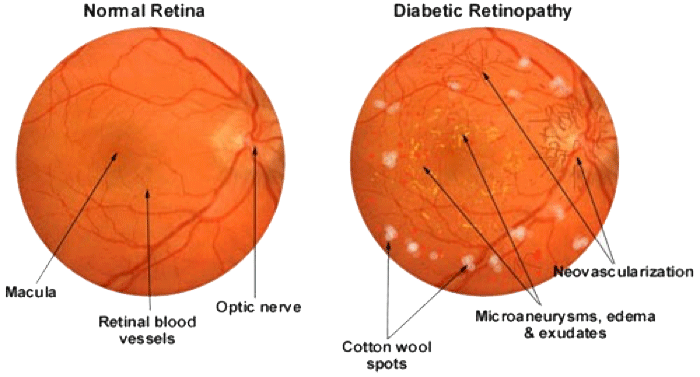
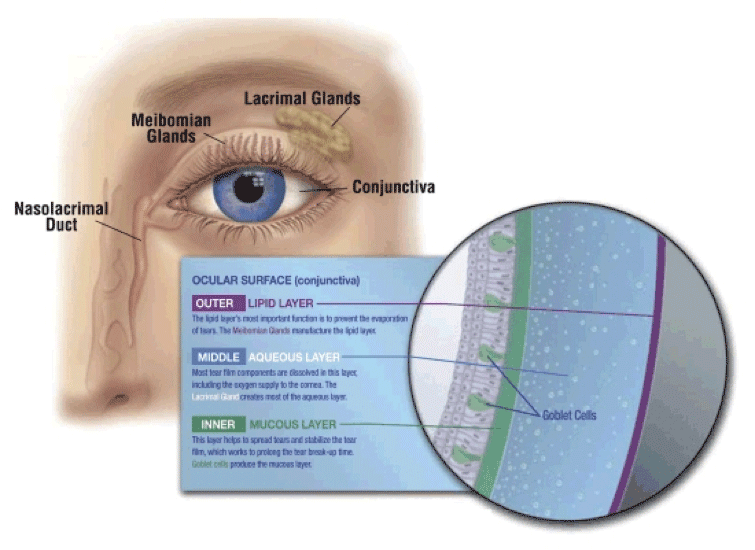
Age – Tear production decreases with age
Gender – Women are more prone to dryness due to hormonal changes through life
Medications – Antihistamines, antidepressants, decongestants, and blood pressure medications just to name a few
Medical conditions like thyroid conditions, diabetes or autoimmune disorders like rheumatoid arthritis can cause dry eyes.
Environmental conditions – exposure to smoke, wind, dry environments
Contact Lenses – In some cases, contact lenses can cause dry eye; however, this could be due to improper wear style or overwear of a specific type of lens. In many cases, changing habits or materials could alleviate the problems.
Examination of the surface of the eye and eyelids, as well as tests to measure tear production and quality can be used to determine whether or not one has dry eye. If you have any concerns regarding these symptoms, please contact our office for an appointment with one of our doctors. Our providers are well-trained in the diagnosis and management of this condition.
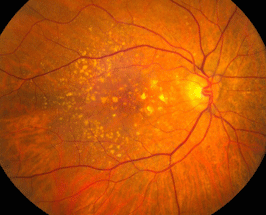
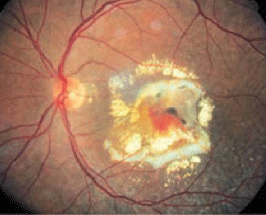
At Carolina Optometry Associates, we can detect and form a plan of treatment for macular degeneration by simply performing your yearly comprehensive eye exam. Certain special testing may be required such as retinal photographs, optical coherence tomography (OCT), or fluorescein angiography to manage macular degeneration. The key is detection and monitoring with a bare minimum of yearly examination. In many cases, the special eye care needed for this disease requires more than one exam a year.
Treatment:
Currently, there is no treatment for dry AMD, though with close monitoring at our office, we can help detect changes to your central vision. Studies have shown that certain vitamin therapies can help to reduce the risk of the macular degeneration progressing. We also co-manage with retinal specialists regarding new and future therapy for treatment options. There is however a treatment for wet macular degeneration. Although the visual outcome of this type of AMD is worse, the possibility of halting or slowing the disease process is promising.
Given enough severity, macular degeneration can be very detrimental to every day tasks. Some patients may require vision aids to help them with things around the house and their job. Taking care of your vision now, by eating right, staying active, wearing sunglasses and refraining from smoking can help maintain healthy eyes.
At Carolina Optometry, we will offer you a full comprehensive eye exam that will allow us to detect this disease and determine the best possible course of action using state-of-the-art equipment and recommend therapies that our engaging providers feel is in the best interests of our individual patients. In the event surgical intervention is required, we can refer and co-manage all of our cases with highly specialized retinal surgeons.
If you feel that you meet any criteria listed above or have any of the risk factors for this disease, please feel free to call to schedule an appointment with one of our experienced eye doctors.
Dr. Andrew Graves is originally from Oxford, Mississippi where he lived for 20 years. He is a graduate of the University of Mississippi with a degree in Biochemistry. He earned his Doctor of Optometry degree from the University of Alabama at Birmingham School of Optometry in 2009. While in training, he completed rotations in a private practice in Sanford, North Carolina, the Veteran’s Affairs Medical Center in Tuscaloosa, Alabama, and 2 rotations at UAB Eye Care Clinic in Birmingham, Alabama. Upon graduating he spent one year in rural West Virginia working in a small private practice until deciding to move to North Carolina to start his family. Dr. Graves has been licensed by the North Carolina State Board of Optometry to practice in this state since 2010. Dr. Graves practices full-scope optometry with emphasis in contact lenses, ocular diseases such as glaucoma and macular degeneration, and pediatrics eye health. Dr. Graves and his wife founded Carolina Optometry Associates in March of 2015. He currently lives in Apex with his wife Melissa and their two boys, Peyton and Cooper. As is the match made in heaven, both he and his wife are both SEC football fans with obvious allegiances. Beyond the football in the house, Dr. Graves enjoys spending most all of his free time with his family.
Dr. Melissa Graves is a native of New Jersey. Her family and studies took her to Alabama where she completed a degree in Biology and Chemistry. She graduated from the University of Alabama at Birmingham in 2002 and proceeded to perform research in Biochemistry while awaiting admittance to optometry school. She received her Doctor of Optometry from the UAB school of Optometry in 2009. Upon completion of school she performed a postgraduate residency in ocular disease at the Huntington VA Medical Center in Huntington, West Virginia. In this residency she learned state of the art medical therapy for all ranges of ocular disease including glaucoma, macular degeneration, diabetic retinopathy, and cataracts. After her residency, she moved to North Carolina with her husband, Dr. Andrew Graves where both worked as independent doctors of optometry in various locations. Their goal of opening their own business has finally come true as they founded Carolina Optometry Associates in 2015. Melissa spends most of her free time chasing her two sons Peyton and Cooper. She also enjoys running, cooking, watching football, and listening to music.
Dr. Gayatri Dhruva was raised in Atlanta, GA and earned her undergraduate degree in Biology at Georgia State University. She completed her optometric education at Southern College of Optometry in Memphis, TN where she received her doctorate degree. After graduation in 2006, Dr. Dhruva moved to Salisbury, NC where she completed residency at W.G. Hefner VA Medical Center specializing in ocular disease and primary care. In her spare time, Dr. Dhruva enjoys traveling, cooking, and hiking. She also enjoys spending time with her husband and three daughters.

![]()
Schedule your appointment today! Please call (919) 755-2814 for our Raleigh location or (919) 331-6042 for our Apex location. You may also reach us via email at coa@carolinaoptometry.com.
Carolina Optometry Associates is a family run business providing thorough eye health examinations to patients of all ages. Our eye doctors are well trained to handle any and all eye care needs. We are accepting new patients and welcome back our previous patients. Currently we can handle family scheduling along with walk-in availability when possible. Please see our insurance information to find out if we accept your specific plan. If you have no insurance we offer fair and competitive pricing for all of your eye care services.
We welcome all patients to schedule an appointment. If you are interested in a new glasses prescription, contact lens prescription, routine eye exam or simply would like to know more about your eye health, the doctors of Carolina Optometry Associates look forward to your visit.
We are currently located in the Apex Costco location off of highway 64 as well as the North Raleigh next door to the Costco off Wake Forest Road. As our location is on the premises of the Costco parking lot, a lot of patients ask if they must be members to be seen in our practice. The answer is no. You do not have to be a member of Costco to be our patient; however, the benefits of membership allow purchase of glasses and contacts through the warehouse.